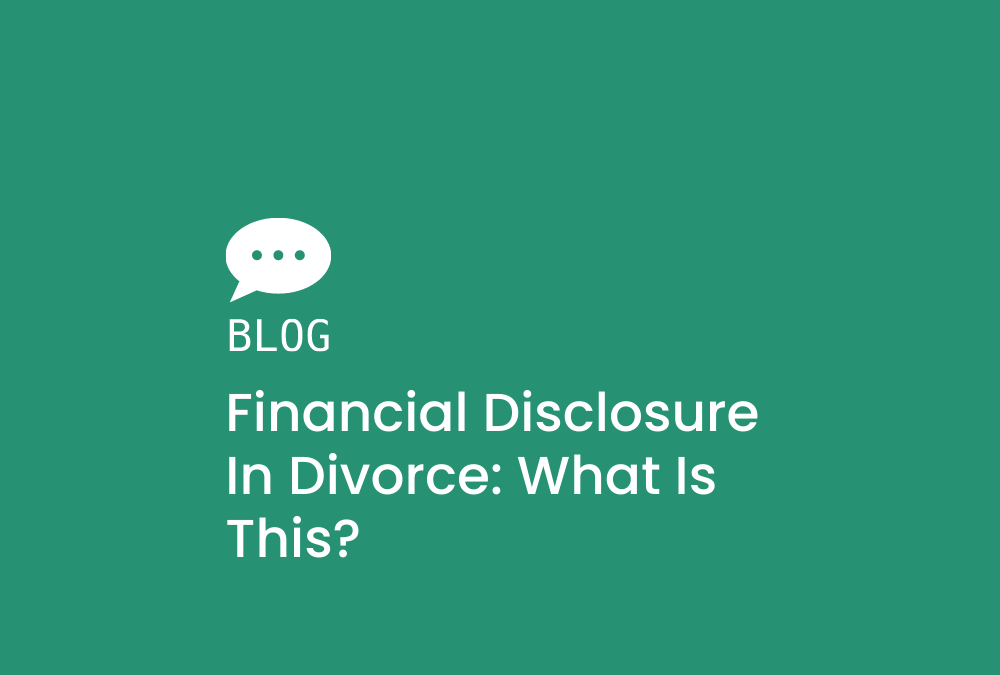Financial Disclosure in Divorce: What is this?
When sorting out the finances of the marriage on divorce, before a solicitor is able to proceed with negotiations and offer advice on an appropriate financial settlement, “full, frank and clear” financial disclosure is required.
What is full and frank financial disclosure?
This is were both parties exchange full details of their financial positions. Sufficient disclosure must be provided to allow the parties to make an informed decision on how to separate their finances.
By providing full and frank financial disclosure this protects both parties. This is because:
- It ensures the ‘weaker’ financial party enters into any agreement knowing the approximate value of any claims he or she has and understands the effect that any settlement will have.
- It ensures the ‘stronger’ financial party is protected after a financial settlement has been agreed, as they have provided complete financial disclosure. If financial disclosure has not been provided, the agreement could be subsequently set aside
Advantages of “full, frank and clear” financial disclosure
- Transparency – both parties are aware of the value of each other’s assets.
- Clarity – both parties can quantify what they consider to be matrimonial and non-matrimonial property.
- Legal advice – if solicitors are provided with full disclosure, they are able to fully advise their client on a fair financial settlement between the parties.
- Limits potential future claims – protects the stronger party from allegations of non-disclosure.
Disadvantages of “full, frank and clear” financial disclosure
- Unnecessary – parties may already be aware of the others full assets and therefore, believe exchanging financial disclosure is a waste of time.
- Inaccuracy – some assets are difficult to value and parties may not wish to pay for independent expert valuations
- Change in value over time – the value of some assets such as shares, can vary over time and therefore financial disclosure is only a snap shot at any particular time.
The most common way exchange of financial disclosure is undertaken is by way of each party completing Financial Statements (Form E).
At Consilia Legal, the financial disclosure that we most commonly ask our clients to provide includes the following (where applicable):
- Last 12 months bank statements for all accounts held in either joint or sole names.
- Last 12 months statements for all investments, such as:
- Share portfolios, ISAs, bonds, stocks etc.
- Matrimonial home valuation (we recommend 3 independent valuations).
- Details of any other property owned including valuations as above.
- Recent mortgage statement for all properties.
- Details of any life policies.
- Details of any Loans and other liabilities, such as:
- Credit cards, store cards etc.
- Business interests: including a copy of the business accounts for the last two financial years for each business.
- Business valuation: any documentation that is available to confirm the estimate of the current value of the business for an example a letter from an accountant.
- Details of any Personal possessions, such as:
- Cars, jewellery, furniture, art etc.
- Pensions: a recent statement showing the cash equivalent transfer value (CETV).
- Details of any tax liabilities.
- Details of any trust interests including a copy of any related deed(s).
- Evidence of Income, including:
- income from salary: P60 for the last financial year and last 3 months wage slips;
- bonuses (mandatory or discretionary);
- self-employed income: a copy of your last tax assessment or a letter from your accountant confirming your tax liability;
- partnership income;
- income from company directorship; and
- rental income.
For more information speak to one of our experienced family solicitors on 0113 322 9222 or enquires@consilialegal.co.uk or complete our contact us form.

